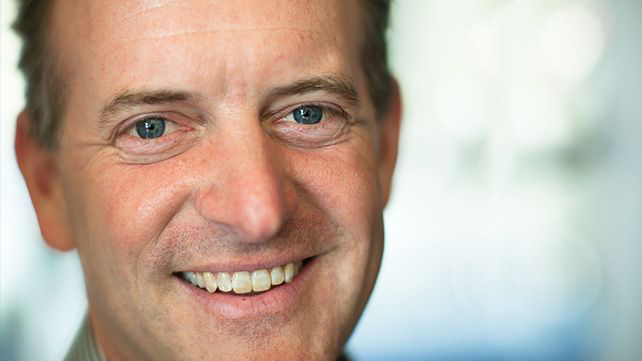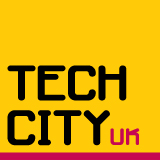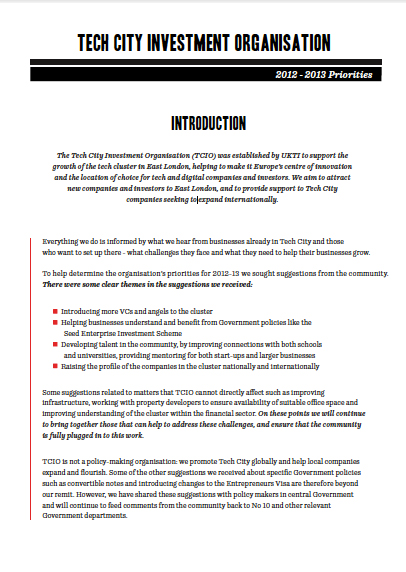 I’m just back from a few days in London participating in The Tech City Entrepreneurs Festival and SVC2UK. I was the guest of Eric Van der Kleij, Charles Seely, Jon Bradford, and a number of really talented and passionate innovators. I’m really grateful to them for including me in the events of the week, and I came away excited and encouraged about Tech City’s prospects.
I’m just back from a few days in London participating in The Tech City Entrepreneurs Festival and SVC2UK. I was the guest of Eric Van der Kleij, Charles Seely, Jon Bradford, and a number of really talented and passionate innovators. I’m really grateful to them for including me in the events of the week, and I came away excited and encouraged about Tech City’s prospects.
True has long hoped to see more broad-based global entrepreneurship, and we’ve been wondering for a long time when the markets of Europe and specifically London would become attractive places for large scale Seed and Series A investing. Each year, we discuss the global True opportunity at our Stinson Beach retreat, and, as is our custom, we rely heavily on the thoughts and advice of those we trust the most: the Founders in the True portfolio. In the case of London, this means we talk about it a lot with Mash Patel, Harry Thompson, and Phil Goffin of Kurtosys, based in London.
We keep an eye on global markets because we are increasingly confident that entrepreneurship is democratizing and spreading across the world. The small business is the solution, not just to America’s economic problems but also to the world’s . In last week’s NY Times, William Deresiewicz discusses the generation of entrepreneurs emerging and points out that, “the small business is the idealized social form of our time.” Closer to the UK, in Sunday’s Independent, Richard Branson argues that the UK needs “a nation of young entrepreneurs,” in order to combat the UK’s economic challenges.
We are eager to see if there are ways for us at True to hasten this trend, because our mission is to make the world a better place for entrepreneurs and to have deep and lasting impact on the lives of our Founders and their co-workers. The True portfolio now employs over 1,500 people worldwide, and, while this is an important and impressive start, it is only a start. Our vision is to empower global entrepreneurship, and we believe our approach could and should work anywhere.
After my time in London, it’s clear that many of the same drivers of success in the US entrepreneurial market are at work in London. Increasing capital efficiency is driving down the costs to start a company, which means risks are lower to start, and smaller amounts of capital can have an enormous impact. Successful innovators of our time like Steve Jobs, Richard Branson, Mark Zuckerberg, and many others have shown the world the power of the creative founder, and these examples are spread instantly across the globe via Facebook and Twitter, then down to our pockets to our Android and iOS devices. Many of us use Skype and Spotify throughout our days, which reminds us that the region can and will spawn internet-scale companies. The digital globe is instantly connected, and this means that inspiration, best ideas, and collaborative thought can spread. It means we may be at a tipping point for global entrepreneurship.
London has several specific strengths going for it that I saw in abundance this week: it is an inherently global city, and the entrepreneurs with whom I met had global ambitions. Many of the ideas were targeting emerging users in Africa and Brazil, and these Founders are thinking of the worldwide trends from the start. Though we have some of this consciousness in the US, the global view feels omnipresent in the London entrepreneur scene. It’s reinforced by the city’s historic role in Europe, as well as by the deeply multicultural population. The Internet is a global medium, and we will soon see more cross border platforms emerge. London’s global perspective could give it an edge.
At the micro level, I was struck by an observation made by Andrew Cleland of Comcast Ventures on our Saturday panel. He described how much harder it is in the UK to be an entrepreneur. This, he said, means that only the most determined entrepreneurs go for it. I can’t believe I missed this, and I absolutely love what this means: the boldest and most daring entrepreneurs persevere despite risks of all kinds. Perhaps the fact that this was a more difficult climate historically means that it is breeding more resourceful, tenacious, and creative entrepreneurs. I hope this is true.
Then there were the entrepreneurs I saw on Friday at Tech City’s “pitch day.” I listen to pitches for a living, and I was really impressed with the quality of teams, the clear and concise thinking, and most of all the passion that I saw in eyes of entrepreneurs on Friday at the Tech City Entrepreneur Festival. The Founders on stage were every bit as talented and driven as any I’ve seen.
This week also demonstrated that London is blessed with government understanding and support of entrepreneurship. During my visit the Minister of State for Universities and Science, David Willetts, spoke about Prime Minister Cameron’s commitment to startup formation and their early success with Tech City (600 companies started – truly impressive!). Andrew Levi, the Managing Director for the Business Group of the UKTI, was omnipresent at the week’s events, which lent an important and firm confidence to the mission of Tech City. My host Eric van der Kleij, the CEO of the Tech City’s Investment Organization, assembled an incredibly impressive list of international entrepreneurs, investors, and executives for the week.
The talent and energy behind Tech City is substantial, and I applaud the leadership for their vision, because innovation and technology are the only way I see to save the world’s economies. As I’ve written many times, venture capital and entrepreneurship matter because they change lives and create jobs on a grand scale. Consider the oft cited Kaufman Foundation statistic that nearly all net new job creation in the US since the seventies has come from small businesses or that the most valuable company on the planet (Apple) was started by a bold entrepreneur and some venture capital or that venture capital investment accounts for 0.02% of US investment but almost 20% of US GDP (NVCA). There is no bigger economic bang for the buck than the powerful combination of venture capital and entrepreneurship.
But it’s not always a smooth path, and, along the way to build things, we make lots of mistakes. In London, there was a lot of discussion around the region’s cultural comfort with risk taking and acceptance of failure. A clear understanding of risk and the embrace failure as part of the creative process is a key reason for Silicon Valley’s (and True’s) success. By openly sharing our losses and disappointments, we all grow stronger. Europe is historically perceived to be less accepting of business failures, so hopefully this new generation of bold and daring European entrepreneurs can be supported and propelled by an ecosystem that celebrates creativity and passion but also embraces risk and failure.
I’m encouraged about the London entrepreneurial scene because I saw an authentic sense of camaraderie during these events, most distinctly at Friday’s evening award ceremonies. It seems as if the important aspects of a good ecosystem are forming. At True, we believe that fortune favors the connected entrepreneur. Open collaboration and peer support make for better decisions, stronger cultures, and more successful companies and founders. A rich and supportive ecosystem makes it easier for entrepreneurs and employees to take the risk necessary to do great things.
Tech City has the raw ingredients to be such an ecosystem. It’s now in the hands of all participants to openly collaborate and help one another succeed.
It’s a tall order, I realize, but in the many meetings I was a part of last week, I saw with my own eyes that this ecosystem is forming in London. It was exciting to witness.





